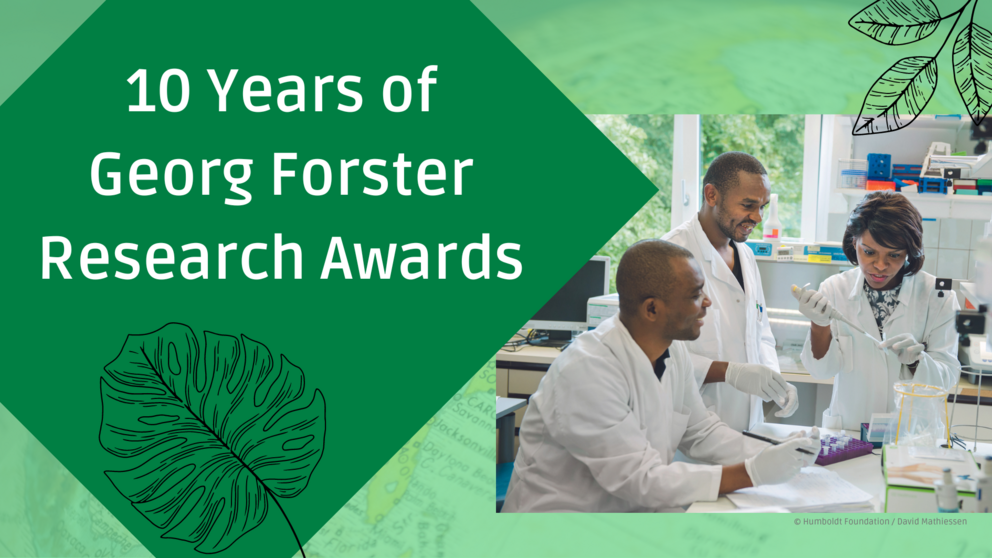
Contact
Press, Communications and Marketing
Tel.: +49 228 833-144
Fax: +49 228 833-441
presse[at]avh.de

This year’s Georg Forster Research Awards, which are granted by the Alexander von Humboldt Foundation and come with €60,000 each, go to five female and five male researchers. Since its establishment ten years ago, this award has singled out researchers from developing and transition countries who have earned international recognition for their research work and seek to solve development-related issues.
“The Georg Forster Research Award gives researchers in developing and transition countries the opportunity to take charge and work on relevant issues together with colleagues in Germany. I would like to thank the Federal Ministry for Economic Cooperation and Development for its long-standing commitment to this award”, said Hans-Christian Pape, President of the Humboldt Foundation. “I am particularly pleased that the number of female researchers from developing and transition countries who were nominated and selected for this award this year was larger than ever before. Particularly in societies dominated by patriarchal structures it is important that female researchers be supported and fostered in these roles. We can’t afford to disregard or ignore women’s creativity and expertise.”
Federal Minister for Economic Cooperation and Development Svenja Schulze: “If we are to solve the global challenges facing us, we need bright minds from all over the world, more international knowledge sharing and collaboration. Researchers from transition and developing countries make vital contributions to development research, whether it be in the area of food security, the treatment of tropical diseases or regarding issues of social participation. Fostering and supporting female researchers from the Global South is of particular importance to me because they offer so much potential. It is therefore essential that we also foster more and more female researchers and spotlight their outstanding achievements with the Georg Forster Research Award. In keeping with this aim, five of this year’s ten awards are going to female researchers.”
In the years since 2012, 71 researchers have been selected to receive a Georg Forster Research Award. Most of them came from Argentina (12), followed by South Africa (8) and Turkey (7). Winning nominees have also come from Egypt, Ethiopia, Brazil and Mexico.
The award winners work on a wide range of topics which illustrate the diverse levers that can be used to improve living conditions in developing and transition countries. Food security, healthcare, environmental protection and resource conservation, social participation, and legal certainty are just a few of the issues that the award winners address in their work.
The award winners are nominated by specialist colleagues from Germany and invited to establish or expand collaborative projects with them. Valued at €60,000 each, the Georg Forster Research Awards are financed by the Federal Ministry for Economic Cooperation and Development.
The Georg Forster Research Award will go to the following individuals this jubilee year:
- Inés Samengo is the head of the Medical Physics Department at the Instituto Balseiro in San Carlos de Bariloche, Argentina. In her capacity as a Georg Forster Research Award winner, the professor of computational neuroscience will work together with colleagues at the Institute for Theoretical Biology at Humboldt-Universität zu Berlin.
- Jill Farrant is a professor of molecular and cell biology at the University of Cape Town, South Africa. An expert in the field of resurrection plants, she will collaborate with the Institute for Cellular and Molecular Botany at the University of Bonn.
- Tahsin Attila Çiner is a professor of sedimentology at the Eurasia Institute of Earth Sciences at Istanbul Technical University in Turkey. He will collaborate with colleagues from the Institute of Geosciences at the University of Potsdam.
- Flávia Piovesan is a professor of Constitutional Law and Humans Rightsat Pontifícia Universidade Católica de São Paulo in Brazil. She will work together with the Max Planck Institute for Comparative Public Law and International Law in Heidelberg.
- Selidji Todagbe Agnandji is a director and head of the Group for Biomedicine and Social Sciences at the Centre de Recherches Médicales de Lambaréné (CERMEL) in Lambarene, Gabon. He will continue his research work on improving the health and quality of life of the peoples of sub-Saharan Africa with colleagues from the Institute for Tropical Medicine at the University of Tübingen.
- Suresh Prins Benjamin is a professor of entomology and head of the Ecology and Environmental Biology Department at the National Institute of Fundamental Studies in Kandy, Sri Lanka. He will work together with expert colleagues from the Zoological Research Museum Alexander Koenig in Bonn.
- Bruno Lenta Ndjakou is a professor of natural products chemistry in the Department of Chemistry at Université de Yaounde I in Cameroon. He will collaborate with the Institute of Organic and Bioorganic Chemistry at Bielefeld University.
- Khalida Ghanem is a professor of communication technology at the Center for Development of Advanced Technologies (CDTA) in Algiers, Algeria. She will be conducting research at the Department Artificial Intelligence in Biomedical Engineering (AIBE) of Friedrich-Alexander-Universität Erlangen-Nürnberg.
- Joseph C. A. Agbakoba is a professor of practical philosophy at the University of Nigeria. As a Georg Forster Research Award winner, he will be collaborating with expert colleagues in the Department of Philosophy at the University of Bayreuth.
- Esra Çapanoğlu Güven is a professor of food chemistry in the Department of Food Engineering at Istanbul Technical University in Turkey. She will be working together with specialist colleagues at the Institute of Food Science and Human Nutrition at Leibniz University Hannover.
This research award is named after the naturalist, travel writer and journalist Georg Forster (1754–1794), a friend of Alexander von Humboldt. Particular importance will be paid to nominations of qualified female researchers.
(Press release 32/2022)
Every year, the Alexander von Humboldt Foundation enables more than 2,000 researchers from all over the world to spend time conducting research in Germany. The Foundation maintains an interdisciplinary network of well over 30,000 Humboldtians in more than 140 countries around the world – including 63 Nobel Prize winners.
